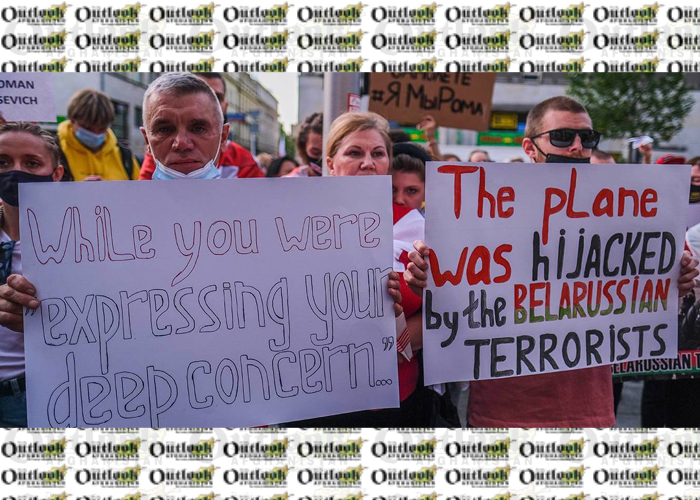Belarusian President Aleksandr Lukashenko has once again demonstrated the lengths to which he will go to crack down on his opponents. On May 23, he deployed a MiG-29 fighter jet to force down a commercial flight, which was traveling from Athens to Vilnius, shortly before it left Belarusian airspace. The purpose was to apprehend Roman Protasevich, the former editor-in-chief of the Belarusian opposition publication and social-media channel Nexta, who was arrested after the plane landed in Minsk.
Why a regime that is already under US and EU sanctions would go so far as to hijack a plane traveling from one EU member state to another is not hard to fathom. Nexta is Lukashenko’s public enemy number one. More than just a news portal with millions of followers across multiple social-media platforms (especially Telegram), Nexta has been the single most important conduit for information in Belarus since the country’s fraudulent presidential election last August.
In addition to reporting on Belarusian security forces’ violent crackdown against peaceful demonstrators, Nexta had provided daily instructions on when, where, and how Belarusians should mobilize during last fall’s countrywide mass protests against Lukashenko’s bogus election victory. Its Sunday calls for a National March for Freedom brought as many as 200,000 people into the streets of Minsk. And all of these demonstrators knew precisely what to do, because they were following the playbook published by Protasevich and his colleague, Nexta founder Stepan Putilo.
Following this unprecedented uprising, Lukashenko’s regime panicked, and for good reason.
Nexta was collecting and sharing information and photos from all over Belarus. Every message, photo, and call to action that it published went viral, reaching people across the country and around the world.
The key to Nexta’s power was that it based itself outside of Belarus, in Warsaw. The Lukashenko regime could neither turn off its internet connection nor imprison or shoot it, as it was doing with opposition outlets and protesters still in Belarus. Lukashenko was doubtless infuriated by the fact that the protests were being guided not so much by Svetlana Tikhanovskaya, the likely winner of the August election, but by an elusive new-media operator beyond Belarus’s borders.
Since the release in March of a Nexta documentary film exposing Lukashenko’s ill-gotten riches (similar to a recent viral film about Russian President Vladimir Putin published by the now-imprisoned opposition leader Alexei Navalny), Lukashenko has been prepared to move heaven and earth to take down his twenty-something bêtes noires. In his mind, Nexta is the keystone buttressing all of the various fronts of the resistance.
Because the Ryanair flight was much closer to Vilnius than to Minsk, the Lukashenko regime’s claim that a bomb threat necessitated an emergency landing in the Belarusian capital is not credible. Once it was on the ground in Minsk, they made a fleeting show of searching passengers and their luggage before quickly apprehending the young dissident and his girlfriend.
The detention of Protasevich’s girlfriend is a classic method of the KGB (as the Belarusian security service is still called), particularly when the intent is to extract confessions. Protasevich is an extremely valuable catch for Lukashenko, because (the dictator assumes) he has the contacts of virtually all of Belarus’s activists.
The day after seizing Protasevich, the regime released a video of him admitting to his past participation in the protest.
The same tactic has also been used on Tikhanovskaya, whose husband was already in prison. When she was abducted after the first August protests in Minsk, she was forced to record a speech calling for an end to the uprising, most likely after having seen her husband being threatened with torture. She has since been expelled from the country, and because everyone in Belarus is familiar with these methods, no one blames her for remaining largely on the sidelines.
The hijacking is meant to send a message. To the opposition, Lukashenko wants to say, “Your days are numbered. You are traitors, and we kill traitors.” And to the European Union, he has issued a direct challenge: “We can make fools of you whenever it suits us, and you will not hurt us, because you are weak.”
Such conclusions are not unwarranted. After all, the Kremlin, whose domestic supporters gloated about the hijacking and Protasevich’s arrest, poisoned Navalny with a nerve agent and paid almost no price for it.
The United States, Britain, and the EU expressed concern and imposed symbolic sanctions, and Russia responded by putting Navalny in a labor camp.
When the Czech Republic revealed last month that Russia had been behind explosions at a weapons depot that killed two Czechs in 2014, the reaction was much the same. In fact, President Joe Biden’s administration has just waived sanctions against a company building the Nord Stream 2 pipeline between Russia and Germany.
Clearly it is money, not principles, that matters. Lukashenko is following Russia’s example.
The Kremlin has long gloried in embarrassing foreign security services that try to protect opposition figures, usually by attacking exiled dissidents right under their noses, as with the March 2018 attempted assassination of Sergei Skripal in Salisbury, England. Protasevich had received political asylum in Lithuania. Given that Nexta is based in Poland, it is worth asking if the Polish authorities did everything they could – or anything at all – to protect and warn him and his colleagues against the dangers they faced. It should have been clear that Protasevich and Putilo were in danger. It is well known that Russia and Belarus will target those whom they consider traitors, even when they are abroad. Now it is well known how far they will go for that purpose.
Home » Opinion » Hijacking Western Complacency
Hijacking Western Complacency
| Sławomir Sierakowski

